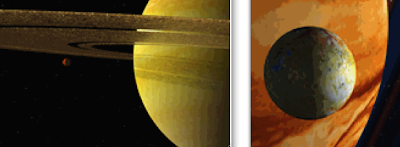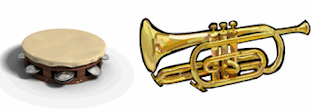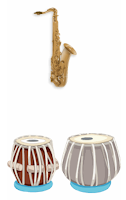TODAY’S SPECIAL: Psalm 150:1-6
TO CHEW ON: "Let everything that has breath praise the Lord. Praise the Lord." Psalm 150:6
To help the people celebrate, David and other song writers wrote praise psalms. One of them is Psalm 150. We learn many things about praising God from this psalm.
We learn that praise can sound from many places. It can come from a sanctuary or a church. It can also come from nature, like the “mighty heavens,” those beautiful stars, planets, the sun and the moon that God made. Can you think of more places?

We learn that we praise God for many reasons. We may praise God for His “acts of power.” These could be miracles that God has done.
People in Bible times would think of things like how God sent plagues on the Egyptians so the Israelites could go free, or dried up the Jordan River so they could cross.
We can praise God for these things too. But we can also praise God for the mighty acts that God has done for people in our time. Perhaps you’ve heard stories of how God has healed people, or helped them escape from dangerous situations, or sent someone to rescue them just in time. Maybe God has done something like that for you. This is a great reason to praise God.
We also praise God for His “surpassing greatness.” This is praise to Him just because of who He is – all knowing, all powerful, all seeing, merciful, just, kind, eternal. When we think of God – how big and amazing He is – we can’t help but praise Him.
This Psalm also helps us learn ways to praise God. We can sing, dance and play musical instruments. Do you praise God like that? The people in Bible times played many instruments.

List the instruments that the writer mentions in Psalm 150:2-4.
1. ______

Have you seen any of those? Circle the ones you know.
Now add to the list instruments that people in your church play to worship God.
Finally, we learn who should praise God. Who? (Psalm 150:6)
2. _______ Does that include you?
PRAYER: "Let everything that has breath praise the Lord. Praise the Lord! Amen"
MORE: Make a Tambourine
One of the musical instruments in Psalm 150 is a tambourine. Make a tambourine of your own.
What you need:
2 paper plates; crayons or paints, stapler, dried beans
What to do:
1. Decorate the bottom of both paper plates with the crayons or paints.
2. Place one plate, decorated side down, on a work surface.
3. Place the other plate, decorated side up, on top of the first plate.
4. Staple the plates together around the rim, leaving a 4-inch space.
5. Slip a handful of beans into the space between the two plates.
6. Finish stapling the plates together, making sure there are no spaces where beans can escape.
Play your tambourine:
Put on your favorite praise CD and join in the praise with your tambourine.